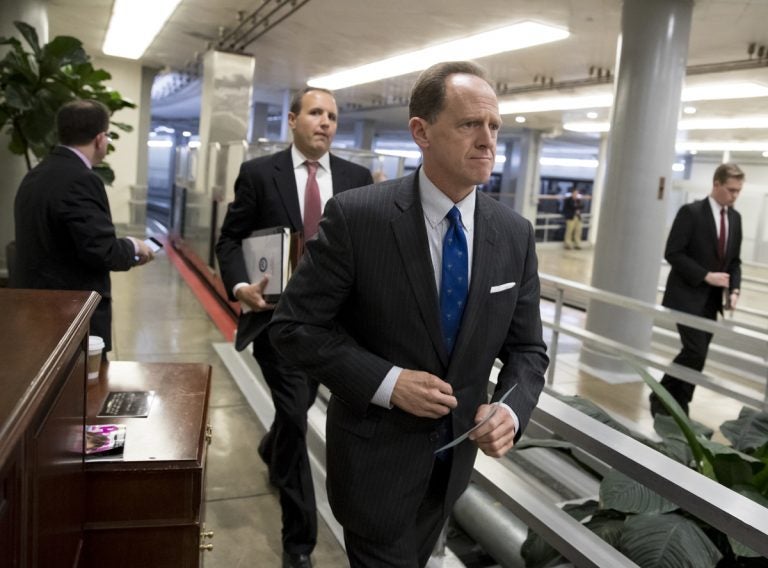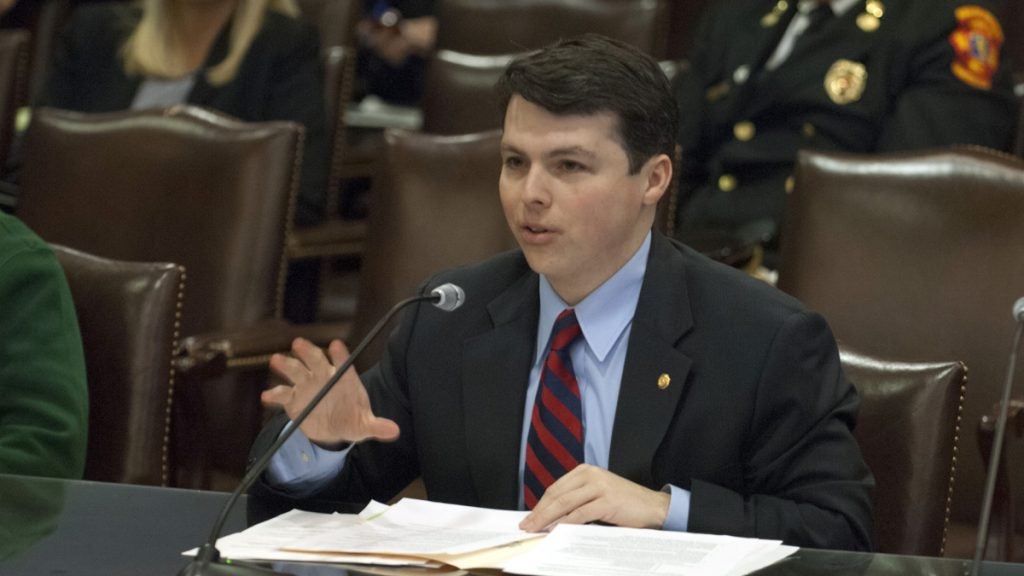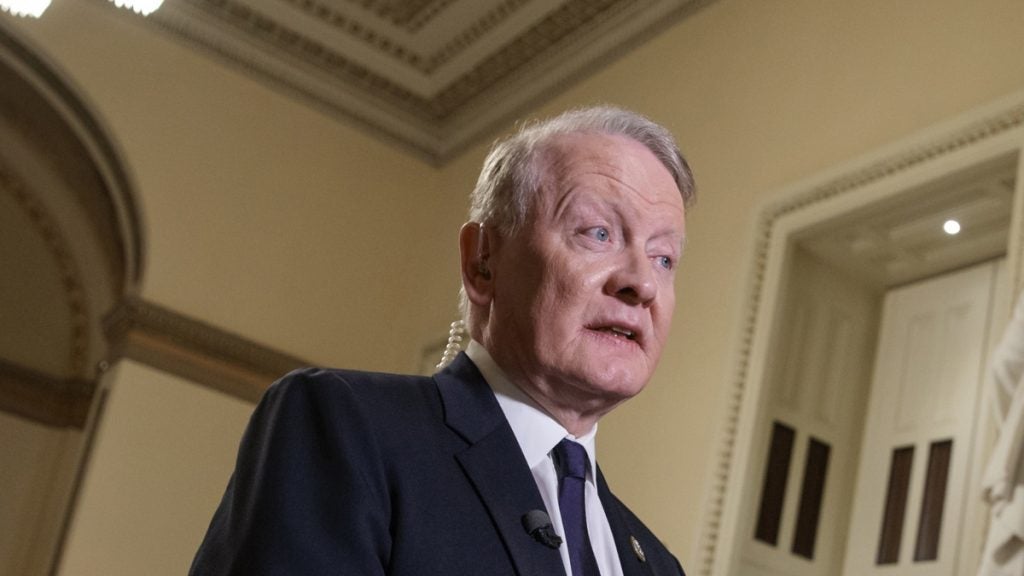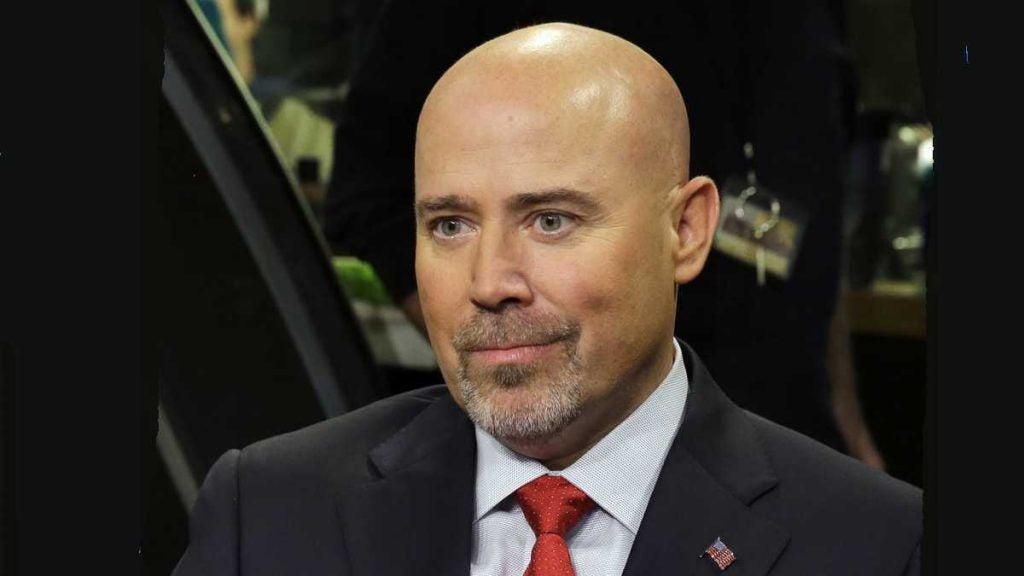N.J., Pa. GOP push tax overhaul, with one key reservation — property tax deductions
The effort to overhaul the nation's tax code is testing the GOP's ability to govern, and right now the region's lawmakers are highlighting the difficulty facing party leaders.
Listen 4:54
Sen. Pat Toomey, R-Pa., a member of the Senate Budget Committee, heads to the floor during a series of votes at the Capitol in Washington, Thursday, Oct. 19, 2017. (J. Scott Applewhite/AP Photo)
Last night the U.S. Senate approved a budget blueprint that could pave the way for a $1.5 trillion tax overhaul.
That has lawmakers who represent the Philadelphia region in Washington engaged in a fierce debate over tax reform.
Pennsylvania Republican Sen. Pat Toomey is at the center of negotiations on tax reform. He sits on the Finance Committee which is ground zero for the debate in the upper chamber, which is why President Trump invited Toomey and a bipartisan group of senators to the White House this week. On the Senate floor Toomey explained why he sees tax reform as vital.
“Why is it important? The main reason it’s so important is that we — our entire country — has been laboring with such feeble economic growth,” Toomey said.
Toomey wants the plan to reduce tax rates, while also increasing the standard amount average Americans can deduct each year while also providing a larger tax credit to families with children.
“It absolutely has to provide tax relief for hard working Americans — middle income, lower income, people of modest means many of whom live paycheck to paycheck. There has to be a direct tax benefit for those Pennsylvanians,” Toomey added.
The White House wants to slash the corporate tax rate from 35 percent to 20 percent, which it says will in turn mean more money in the pockets of average Americans. It also wants to end the estate tax on families passing on assets worth more than $5 million. Democrats like U.S. Rep. Brendan Boyle of Philadelphia say the GOP plan is a nonstarter.

“So it’s terrible in two respects: number one — it gives almost all the benefit, 80 percent of the benefit, to the richest 1 percent. And number two, it raises taxes on many middle-class working families to pay for it,” Boyle said.
The non-partisan Tax Policy Center analyzed the plan and says the wealthiest 1 percent of Americans make out the best form it, while 28 percent of middle class workers would actually see a tax increase. Boyle says that’s unacceptable.
“If you live in Northeast Philadelphia or suburban Philadelphia, giving what you pay in state taxes, what you may pay in Philly wage tax, what you pay on property tax, it is likely and if you have kids, because of the personal exemptions, it is very likely that you will see their taxes go up under the Republican plan, not down,” Boyle said.
Many House Republicans from our region still aren’t on board with their chamber’s version of the plan because it would end the ability to deduct your state and local taxes. That would hit New Jersey and Pennsylvania especially hard. It’s something Senator Toomey didn’t address during the debate on the floor, in the past he has contended most people will still end up saving on taxes because of other changes as part of the overhaul. It’s worth an estimated $96 billion.
National Republican leaders may favor ending the deduction but U.S. Rep. Leonard Lance from Central Jersey is trying to get that provision stripped out.

“New Jersey is one of those states that would be hardest hit, perhaps the state hardest hit, if this were to be eliminated. And this was on the table in 1985 and 1986, but it was eventually taken off the table. And it’s ineffective form of double taxation,” Lance said.
Lance says he doesn’t like that party leaders are once again singling out states like New Jersey to pay for tax cuts elsewhere.
“New Jersey subsidizes other states in so many ways, and if you look at the entire framework, we’re a state that sends a great deal more revenue to Washington that we receive back,” he said.
Home builder associations also oppose that provision because they worry it will hurt business if people can’t deduct their property taxes from their federal returns. U.S. Rep. Tom MacArthur from South Jersey says he’s still undecided on the proposal, but he’s lobbying hard to get those provisions stripped out.

“I’m not drawing lines in the sand, I’m going to fight this out, and I’ll hopefully have success in getting this restored. Homeownership is good for American communities, the federal government has every reason to try to support this, and to eliminate property tax as an example, it’s just going to diminish the homeownership,” MacArthur said.
Republicans leaders say eliminating some deductions, and increasing the standard deduction will make filing taxes simpler. MacArthur says he supports that but he’s focused on his broader goal.
“I’m all for simplification, but that’s not the end goal to me. The end goal should be lower taxes for the American people and fairness,” MacArthur said.
The effort to overhaul the nation’s tax code is testing the GOP’s ability to govern, and right now the region’s lawmakers are highlighting the difficulty facing party leaders.
While Republicans are united in wanting to cut taxes, regional disputes over which deductions to keep and which to end are making it challenging to string together all the votes needed in Congress.
WHYY is your source for fact-based, in-depth journalism and information. As a nonprofit organization, we rely on financial support from readers like you. Please give today.




